Financial Accounting: Critical Analysis of AI & Blockchain (ACCT6007)
VerifiedAdded on 2023/06/10
|8
|2043
|242
Essay
AI Summary
This essay provides a critical analysis of the role of Artificial Intelligence (AI) and Blockchain technologies in financial accounting, referencing an article by Daniel Hood. It discusses the conceptual framework of financial reporting, the potential of AI to optimize financial reporting systems, and the use of Blockchain for secure and transparent transaction records. The essay highlights examples of companies using AI and Blockchain, such as Smacc and Walmart, and concludes that these technologies offer significant benefits for the accounting industry by simplifying complex processes and improving accuracy. The student agrees with the arguments made by authors to describe various benefits of using these technologies in the field of accounting. All the arguments are pointing only benefits of the technology only few are there describing the disadvantages of these technologies. With these advantages of technology in finance the student found accounting easier with the involvement of digitalization.
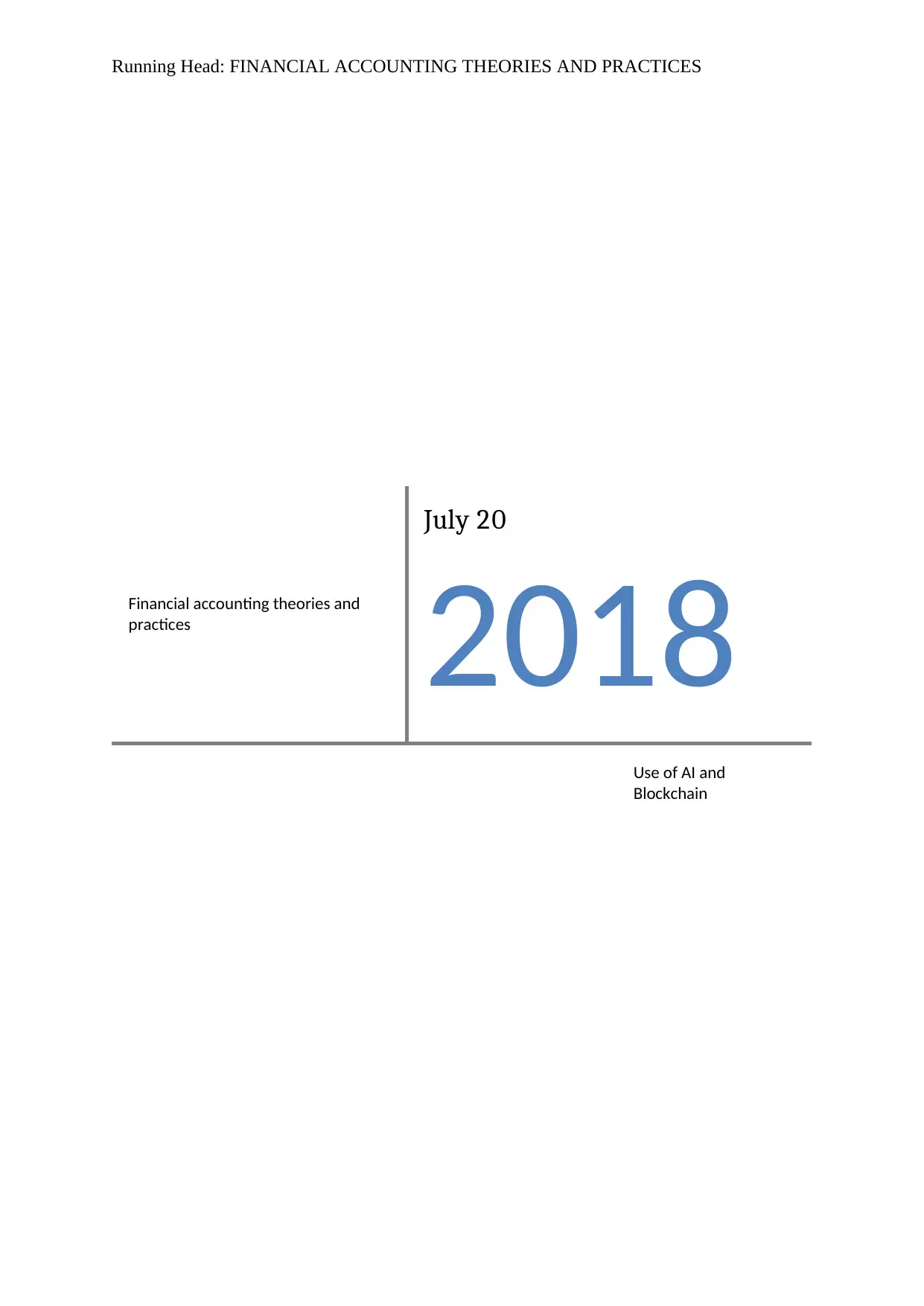
Running Head: FINANCIAL ACCOUNTING THEORIES AND PRACTICES
Financial accounting theories and
practices
July 20
2018
Use of AI and
Blockchain
Financial accounting theories and
practices
July 20
2018
Use of AI and
Blockchain
Paraphrase This Document
Need a fresh take? Get an instant paraphrase of this document with our AI Paraphraser
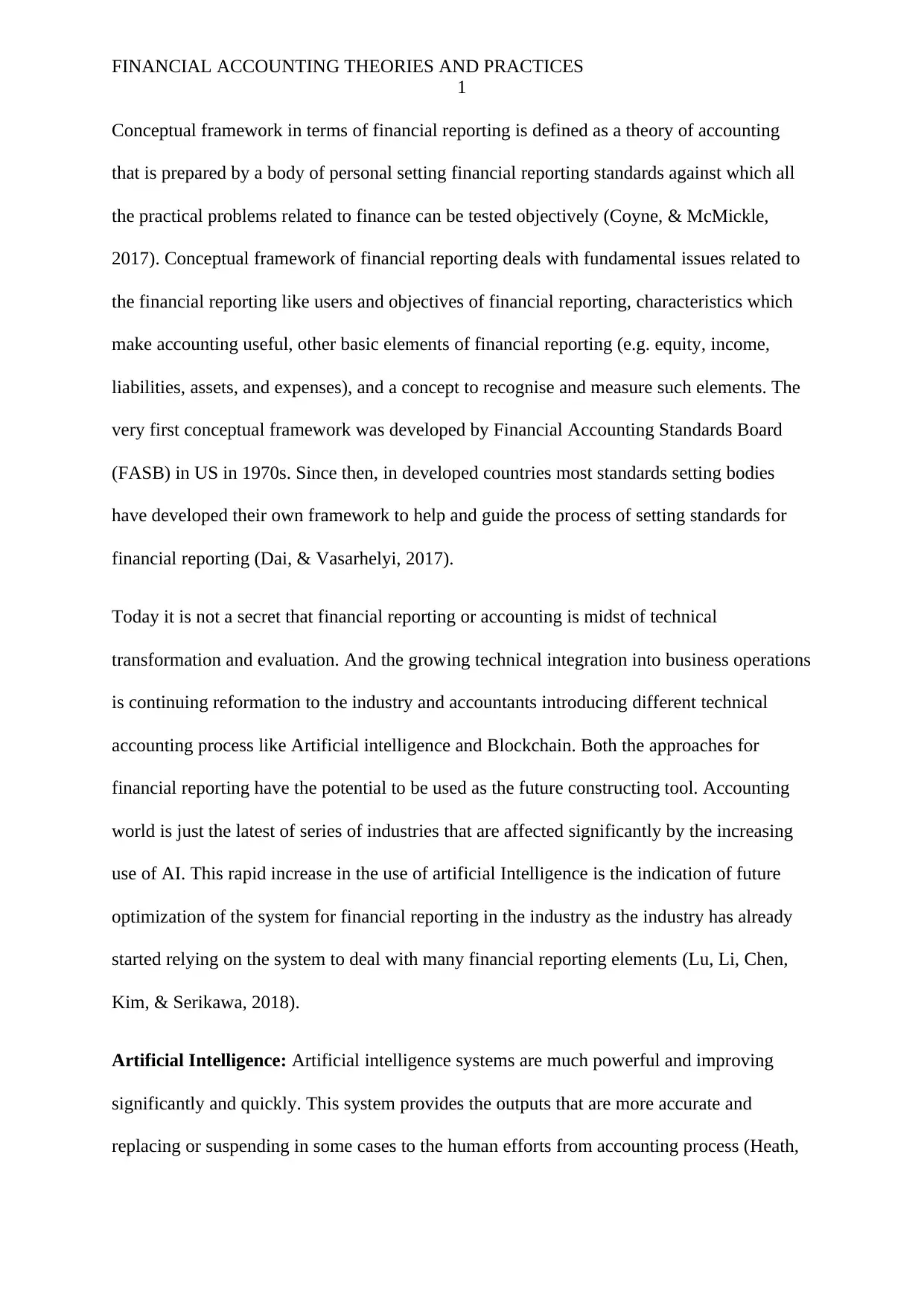
FINANCIAL ACCOUNTING THEORIES AND PRACTICES
1
Conceptual framework in terms of financial reporting is defined as a theory of accounting
that is prepared by a body of personal setting financial reporting standards against which all
the practical problems related to finance can be tested objectively (Coyne, & McMickle,
2017). Conceptual framework of financial reporting deals with fundamental issues related to
the financial reporting like users and objectives of financial reporting, characteristics which
make accounting useful, other basic elements of financial reporting (e.g. equity, income,
liabilities, assets, and expenses), and a concept to recognise and measure such elements. The
very first conceptual framework was developed by Financial Accounting Standards Board
(FASB) in US in 1970s. Since then, in developed countries most standards setting bodies
have developed their own framework to help and guide the process of setting standards for
financial reporting (Dai, & Vasarhelyi, 2017).
Today it is not a secret that financial reporting or accounting is midst of technical
transformation and evaluation. And the growing technical integration into business operations
is continuing reformation to the industry and accountants introducing different technical
accounting process like Artificial intelligence and Blockchain. Both the approaches for
financial reporting have the potential to be used as the future constructing tool. Accounting
world is just the latest of series of industries that are affected significantly by the increasing
use of AI. This rapid increase in the use of artificial Intelligence is the indication of future
optimization of the system for financial reporting in the industry as the industry has already
started relying on the system to deal with many financial reporting elements (Lu, Li, Chen,
Kim, & Serikawa, 2018).
Artificial Intelligence: Artificial intelligence systems are much powerful and improving
significantly and quickly. This system provides the outputs that are more accurate and
replacing or suspending in some cases to the human efforts from accounting process (Heath,
1
Conceptual framework in terms of financial reporting is defined as a theory of accounting
that is prepared by a body of personal setting financial reporting standards against which all
the practical problems related to finance can be tested objectively (Coyne, & McMickle,
2017). Conceptual framework of financial reporting deals with fundamental issues related to
the financial reporting like users and objectives of financial reporting, characteristics which
make accounting useful, other basic elements of financial reporting (e.g. equity, income,
liabilities, assets, and expenses), and a concept to recognise and measure such elements. The
very first conceptual framework was developed by Financial Accounting Standards Board
(FASB) in US in 1970s. Since then, in developed countries most standards setting bodies
have developed their own framework to help and guide the process of setting standards for
financial reporting (Dai, & Vasarhelyi, 2017).
Today it is not a secret that financial reporting or accounting is midst of technical
transformation and evaluation. And the growing technical integration into business operations
is continuing reformation to the industry and accountants introducing different technical
accounting process like Artificial intelligence and Blockchain. Both the approaches for
financial reporting have the potential to be used as the future constructing tool. Accounting
world is just the latest of series of industries that are affected significantly by the increasing
use of AI. This rapid increase in the use of artificial Intelligence is the indication of future
optimization of the system for financial reporting in the industry as the industry has already
started relying on the system to deal with many financial reporting elements (Lu, Li, Chen,
Kim, & Serikawa, 2018).
Artificial Intelligence: Artificial intelligence systems are much powerful and improving
significantly and quickly. This system provides the outputs that are more accurate and
replacing or suspending in some cases to the human efforts from accounting process (Heath,
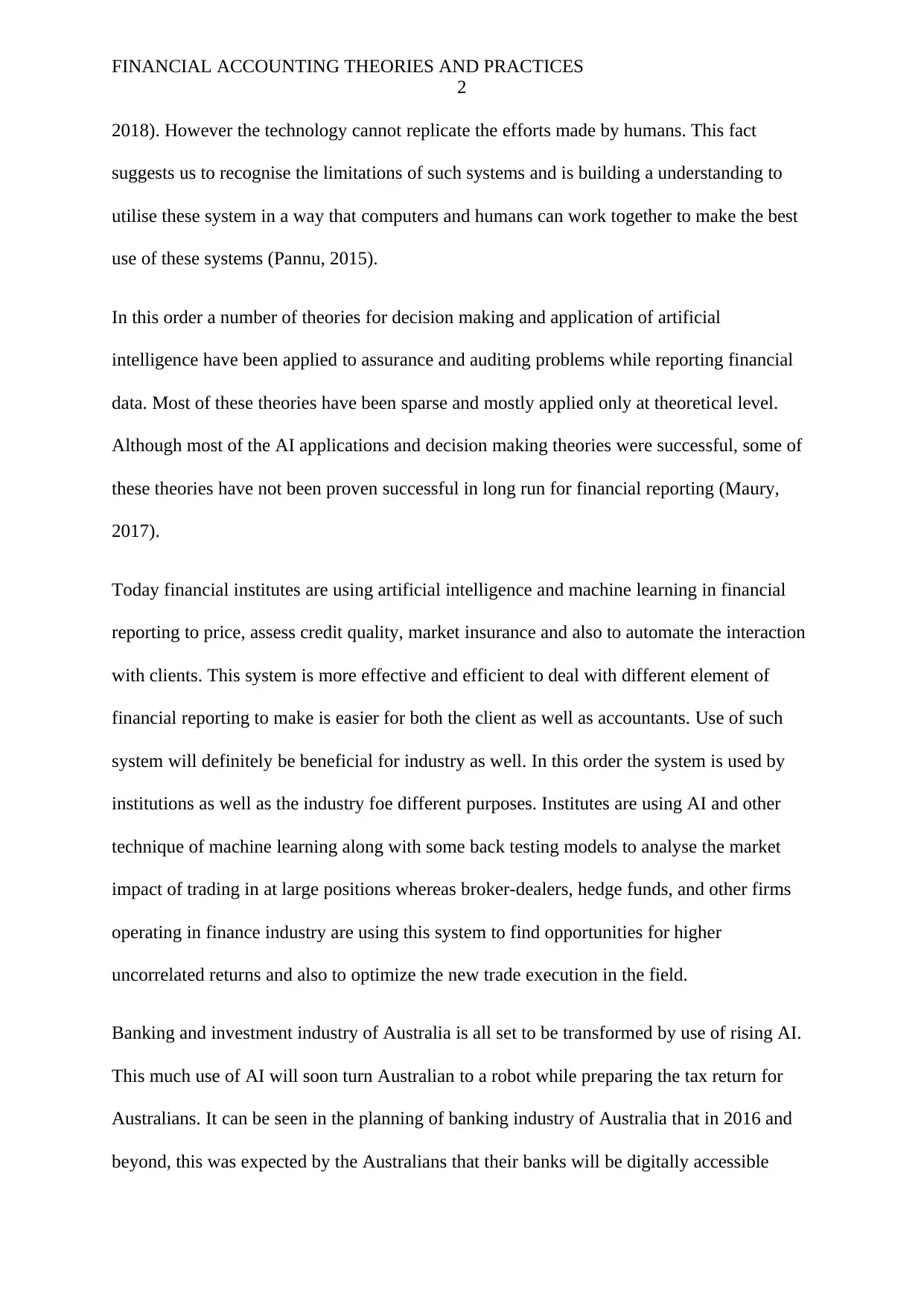
FINANCIAL ACCOUNTING THEORIES AND PRACTICES
2
2018). However the technology cannot replicate the efforts made by humans. This fact
suggests us to recognise the limitations of such systems and is building a understanding to
utilise these system in a way that computers and humans can work together to make the best
use of these systems (Pannu, 2015).
In this order a number of theories for decision making and application of artificial
intelligence have been applied to assurance and auditing problems while reporting financial
data. Most of these theories have been sparse and mostly applied only at theoretical level.
Although most of the AI applications and decision making theories were successful, some of
these theories have not been proven successful in long run for financial reporting (Maury,
2017).
Today financial institutes are using artificial intelligence and machine learning in financial
reporting to price, assess credit quality, market insurance and also to automate the interaction
with clients. This system is more effective and efficient to deal with different element of
financial reporting to make is easier for both the client as well as accountants. Use of such
system will definitely be beneficial for industry as well. In this order the system is used by
institutions as well as the industry foe different purposes. Institutes are using AI and other
technique of machine learning along with some back testing models to analyse the market
impact of trading in at large positions whereas broker-dealers, hedge funds, and other firms
operating in finance industry are using this system to find opportunities for higher
uncorrelated returns and also to optimize the new trade execution in the field.
Banking and investment industry of Australia is all set to be transformed by use of rising AI.
This much use of AI will soon turn Australian to a robot while preparing the tax return for
Australians. It can be seen in the planning of banking industry of Australia that in 2016 and
beyond, this was expected by the Australians that their banks will be digitally accessible
2
2018). However the technology cannot replicate the efforts made by humans. This fact
suggests us to recognise the limitations of such systems and is building a understanding to
utilise these system in a way that computers and humans can work together to make the best
use of these systems (Pannu, 2015).
In this order a number of theories for decision making and application of artificial
intelligence have been applied to assurance and auditing problems while reporting financial
data. Most of these theories have been sparse and mostly applied only at theoretical level.
Although most of the AI applications and decision making theories were successful, some of
these theories have not been proven successful in long run for financial reporting (Maury,
2017).
Today financial institutes are using artificial intelligence and machine learning in financial
reporting to price, assess credit quality, market insurance and also to automate the interaction
with clients. This system is more effective and efficient to deal with different element of
financial reporting to make is easier for both the client as well as accountants. Use of such
system will definitely be beneficial for industry as well. In this order the system is used by
institutions as well as the industry foe different purposes. Institutes are using AI and other
technique of machine learning along with some back testing models to analyse the market
impact of trading in at large positions whereas broker-dealers, hedge funds, and other firms
operating in finance industry are using this system to find opportunities for higher
uncorrelated returns and also to optimize the new trade execution in the field.
Banking and investment industry of Australia is all set to be transformed by use of rising AI.
This much use of AI will soon turn Australian to a robot while preparing the tax return for
Australians. It can be seen in the planning of banking industry of Australia that in 2016 and
beyond, this was expected by the Australians that their banks will be digitally accessible
⊘ This is a preview!⊘
Do you want full access?
Subscribe today to unlock all pages.

Trusted by 1+ million students worldwide
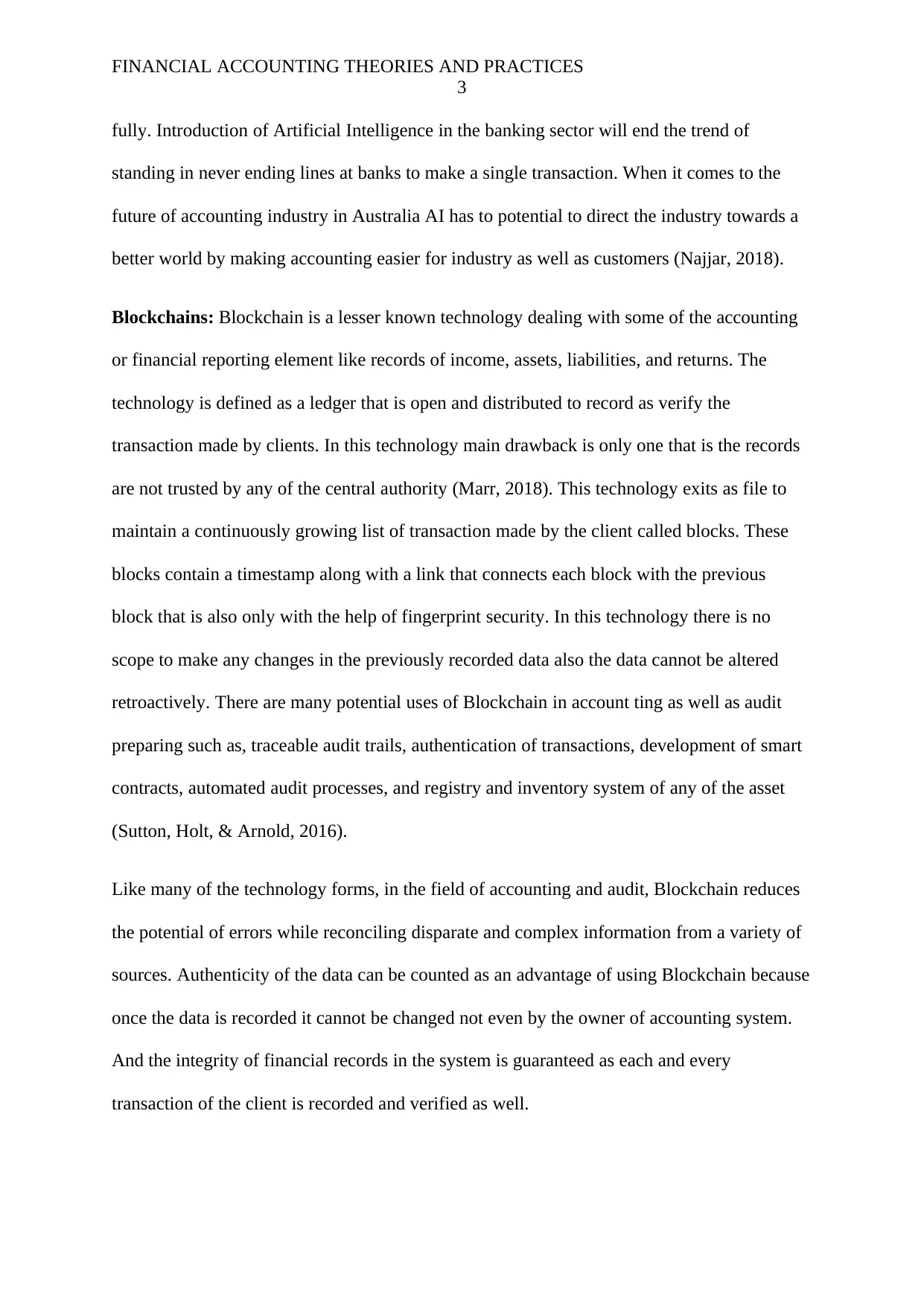
FINANCIAL ACCOUNTING THEORIES AND PRACTICES
3
fully. Introduction of Artificial Intelligence in the banking sector will end the trend of
standing in never ending lines at banks to make a single transaction. When it comes to the
future of accounting industry in Australia AI has to potential to direct the industry towards a
better world by making accounting easier for industry as well as customers (Najjar, 2018).
Blockchains: Blockchain is a lesser known technology dealing with some of the accounting
or financial reporting element like records of income, assets, liabilities, and returns. The
technology is defined as a ledger that is open and distributed to record as verify the
transaction made by clients. In this technology main drawback is only one that is the records
are not trusted by any of the central authority (Marr, 2018). This technology exits as file to
maintain a continuously growing list of transaction made by the client called blocks. These
blocks contain a timestamp along with a link that connects each block with the previous
block that is also only with the help of fingerprint security. In this technology there is no
scope to make any changes in the previously recorded data also the data cannot be altered
retroactively. There are many potential uses of Blockchain in account ting as well as audit
preparing such as, traceable audit trails, authentication of transactions, development of smart
contracts, automated audit processes, and registry and inventory system of any of the asset
(Sutton, Holt, & Arnold, 2016).
Like many of the technology forms, in the field of accounting and audit, Blockchain reduces
the potential of errors while reconciling disparate and complex information from a variety of
sources. Authenticity of the data can be counted as an advantage of using Blockchain because
once the data is recorded it cannot be changed not even by the owner of accounting system.
And the integrity of financial records in the system is guaranteed as each and every
transaction of the client is recorded and verified as well.
3
fully. Introduction of Artificial Intelligence in the banking sector will end the trend of
standing in never ending lines at banks to make a single transaction. When it comes to the
future of accounting industry in Australia AI has to potential to direct the industry towards a
better world by making accounting easier for industry as well as customers (Najjar, 2018).
Blockchains: Blockchain is a lesser known technology dealing with some of the accounting
or financial reporting element like records of income, assets, liabilities, and returns. The
technology is defined as a ledger that is open and distributed to record as verify the
transaction made by clients. In this technology main drawback is only one that is the records
are not trusted by any of the central authority (Marr, 2018). This technology exits as file to
maintain a continuously growing list of transaction made by the client called blocks. These
blocks contain a timestamp along with a link that connects each block with the previous
block that is also only with the help of fingerprint security. In this technology there is no
scope to make any changes in the previously recorded data also the data cannot be altered
retroactively. There are many potential uses of Blockchain in account ting as well as audit
preparing such as, traceable audit trails, authentication of transactions, development of smart
contracts, automated audit processes, and registry and inventory system of any of the asset
(Sutton, Holt, & Arnold, 2016).
Like many of the technology forms, in the field of accounting and audit, Blockchain reduces
the potential of errors while reconciling disparate and complex information from a variety of
sources. Authenticity of the data can be counted as an advantage of using Blockchain because
once the data is recorded it cannot be changed not even by the owner of accounting system.
And the integrity of financial records in the system is guaranteed as each and every
transaction of the client is recorded and verified as well.
Paraphrase This Document
Need a fresh take? Get an instant paraphrase of this document with our AI Paraphraser
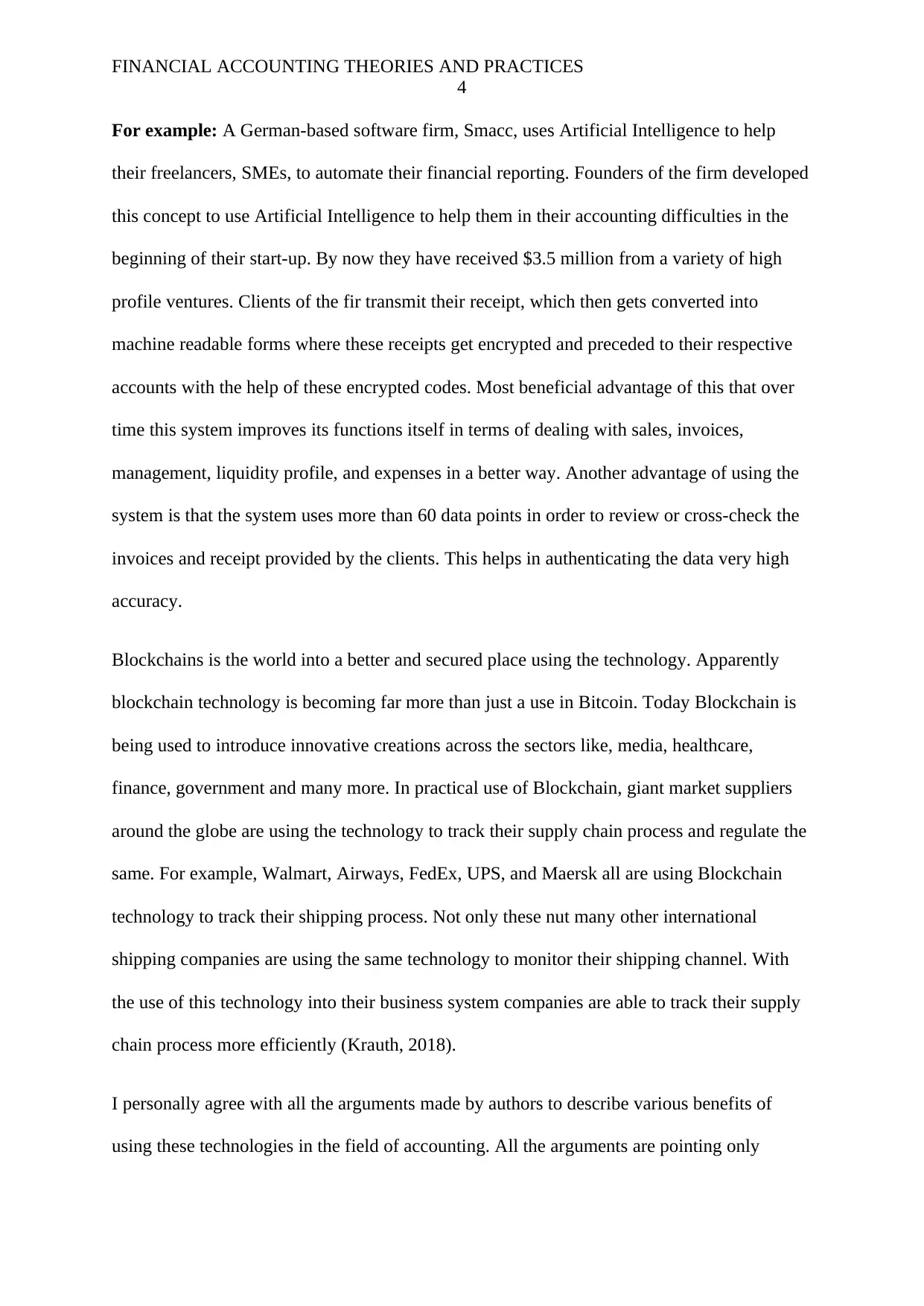
FINANCIAL ACCOUNTING THEORIES AND PRACTICES
4
For example: A German-based software firm, Smacc, uses Artificial Intelligence to help
their freelancers, SMEs, to automate their financial reporting. Founders of the firm developed
this concept to use Artificial Intelligence to help them in their accounting difficulties in the
beginning of their start-up. By now they have received $3.5 million from a variety of high
profile ventures. Clients of the fir transmit their receipt, which then gets converted into
machine readable forms where these receipts get encrypted and preceded to their respective
accounts with the help of these encrypted codes. Most beneficial advantage of this that over
time this system improves its functions itself in terms of dealing with sales, invoices,
management, liquidity profile, and expenses in a better way. Another advantage of using the
system is that the system uses more than 60 data points in order to review or cross-check the
invoices and receipt provided by the clients. This helps in authenticating the data very high
accuracy.
Blockchains is the world into a better and secured place using the technology. Apparently
blockchain technology is becoming far more than just a use in Bitcoin. Today Blockchain is
being used to introduce innovative creations across the sectors like, media, healthcare,
finance, government and many more. In practical use of Blockchain, giant market suppliers
around the globe are using the technology to track their supply chain process and regulate the
same. For example, Walmart, Airways, FedEx, UPS, and Maersk all are using Blockchain
technology to track their shipping process. Not only these nut many other international
shipping companies are using the same technology to monitor their shipping channel. With
the use of this technology into their business system companies are able to track their supply
chain process more efficiently (Krauth, 2018).
I personally agree with all the arguments made by authors to describe various benefits of
using these technologies in the field of accounting. All the arguments are pointing only
4
For example: A German-based software firm, Smacc, uses Artificial Intelligence to help
their freelancers, SMEs, to automate their financial reporting. Founders of the firm developed
this concept to use Artificial Intelligence to help them in their accounting difficulties in the
beginning of their start-up. By now they have received $3.5 million from a variety of high
profile ventures. Clients of the fir transmit their receipt, which then gets converted into
machine readable forms where these receipts get encrypted and preceded to their respective
accounts with the help of these encrypted codes. Most beneficial advantage of this that over
time this system improves its functions itself in terms of dealing with sales, invoices,
management, liquidity profile, and expenses in a better way. Another advantage of using the
system is that the system uses more than 60 data points in order to review or cross-check the
invoices and receipt provided by the clients. This helps in authenticating the data very high
accuracy.
Blockchains is the world into a better and secured place using the technology. Apparently
blockchain technology is becoming far more than just a use in Bitcoin. Today Blockchain is
being used to introduce innovative creations across the sectors like, media, healthcare,
finance, government and many more. In practical use of Blockchain, giant market suppliers
around the globe are using the technology to track their supply chain process and regulate the
same. For example, Walmart, Airways, FedEx, UPS, and Maersk all are using Blockchain
technology to track their shipping process. Not only these nut many other international
shipping companies are using the same technology to monitor their shipping channel. With
the use of this technology into their business system companies are able to track their supply
chain process more efficiently (Krauth, 2018).
I personally agree with all the arguments made by authors to describe various benefits of
using these technologies in the field of accounting. All the arguments are pointing only
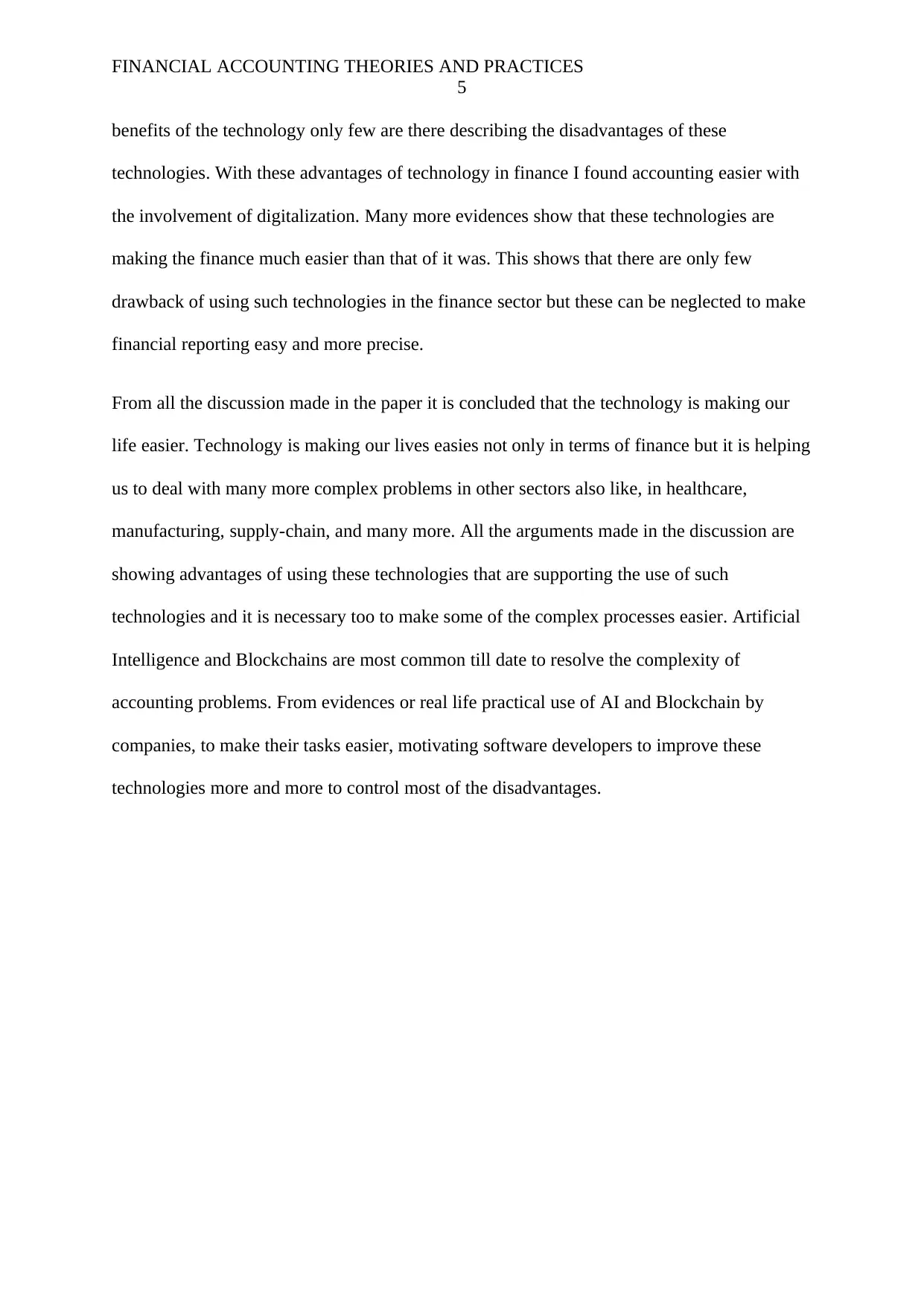
FINANCIAL ACCOUNTING THEORIES AND PRACTICES
5
benefits of the technology only few are there describing the disadvantages of these
technologies. With these advantages of technology in finance I found accounting easier with
the involvement of digitalization. Many more evidences show that these technologies are
making the finance much easier than that of it was. This shows that there are only few
drawback of using such technologies in the finance sector but these can be neglected to make
financial reporting easy and more precise.
From all the discussion made in the paper it is concluded that the technology is making our
life easier. Technology is making our lives easies not only in terms of finance but it is helping
us to deal with many more complex problems in other sectors also like, in healthcare,
manufacturing, supply-chain, and many more. All the arguments made in the discussion are
showing advantages of using these technologies that are supporting the use of such
technologies and it is necessary too to make some of the complex processes easier. Artificial
Intelligence and Blockchains are most common till date to resolve the complexity of
accounting problems. From evidences or real life practical use of AI and Blockchain by
companies, to make their tasks easier, motivating software developers to improve these
technologies more and more to control most of the disadvantages.
5
benefits of the technology only few are there describing the disadvantages of these
technologies. With these advantages of technology in finance I found accounting easier with
the involvement of digitalization. Many more evidences show that these technologies are
making the finance much easier than that of it was. This shows that there are only few
drawback of using such technologies in the finance sector but these can be neglected to make
financial reporting easy and more precise.
From all the discussion made in the paper it is concluded that the technology is making our
life easier. Technology is making our lives easies not only in terms of finance but it is helping
us to deal with many more complex problems in other sectors also like, in healthcare,
manufacturing, supply-chain, and many more. All the arguments made in the discussion are
showing advantages of using these technologies that are supporting the use of such
technologies and it is necessary too to make some of the complex processes easier. Artificial
Intelligence and Blockchains are most common till date to resolve the complexity of
accounting problems. From evidences or real life practical use of AI and Blockchain by
companies, to make their tasks easier, motivating software developers to improve these
technologies more and more to control most of the disadvantages.
⊘ This is a preview!⊘
Do you want full access?
Subscribe today to unlock all pages.

Trusted by 1+ million students worldwide
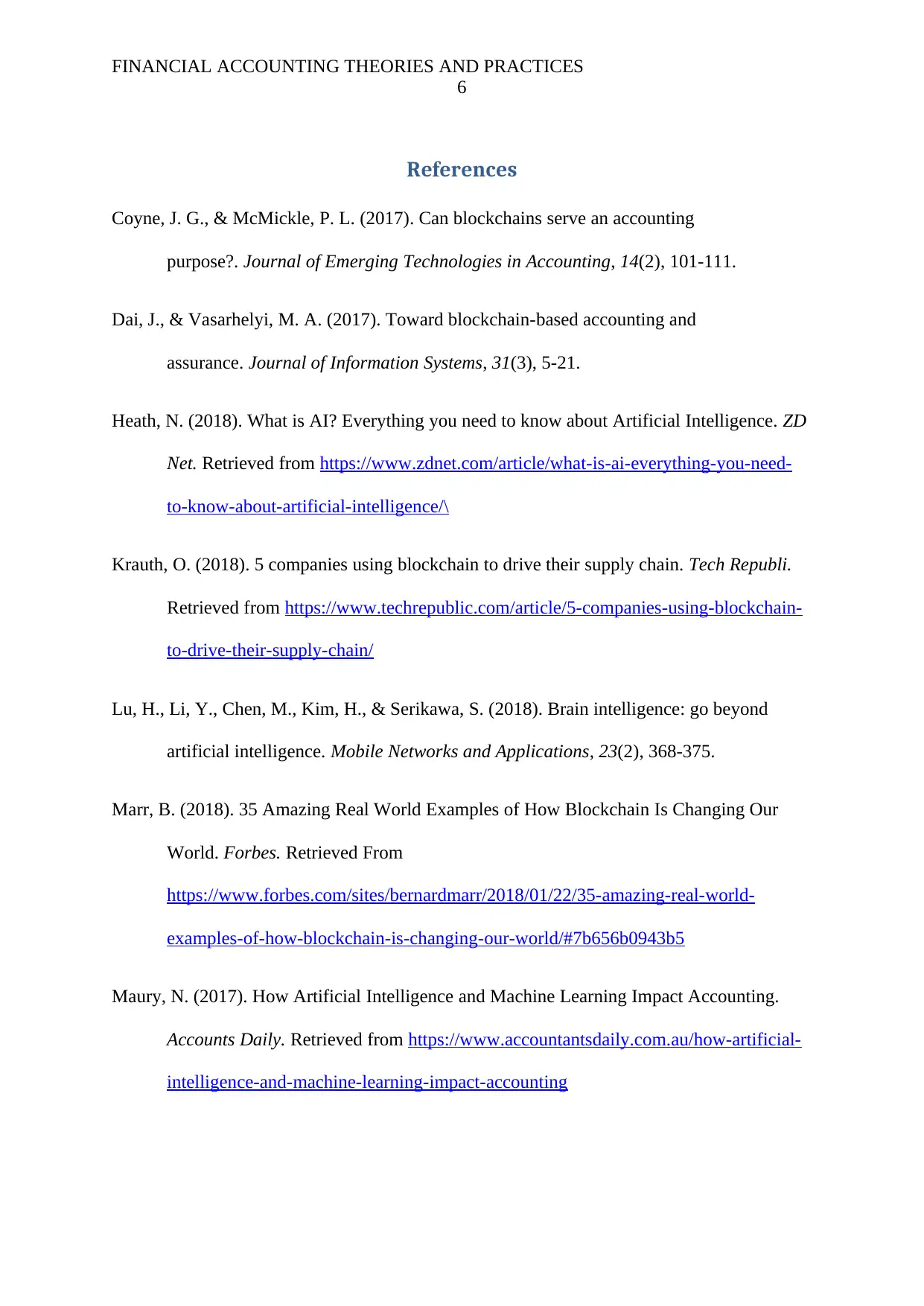
FINANCIAL ACCOUNTING THEORIES AND PRACTICES
6
References
Coyne, J. G., & McMickle, P. L. (2017). Can blockchains serve an accounting
purpose?. Journal of Emerging Technologies in Accounting, 14(2), 101-111.
Dai, J., & Vasarhelyi, M. A. (2017). Toward blockchain-based accounting and
assurance. Journal of Information Systems, 31(3), 5-21.
Heath, N. (2018). What is AI? Everything you need to know about Artificial Intelligence. ZD
Net. Retrieved from https://www.zdnet.com/article/what-is-ai-everything-you-need-
to-know-about-artificial-intelligence/\
Krauth, O. (2018). 5 companies using blockchain to drive their supply chain. Tech Republi.
Retrieved from https://www.techrepublic.com/article/5-companies-using-blockchain-
to-drive-their-supply-chain/
Lu, H., Li, Y., Chen, M., Kim, H., & Serikawa, S. (2018). Brain intelligence: go beyond
artificial intelligence. Mobile Networks and Applications, 23(2), 368-375.
Marr, B. (2018). 35 Amazing Real World Examples of How Blockchain Is Changing Our
World. Forbes. Retrieved From
https://www.forbes.com/sites/bernardmarr/2018/01/22/35-amazing-real-world-
examples-of-how-blockchain-is-changing-our-world/#7b656b0943b5
Maury, N. (2017). How Artificial Intelligence and Machine Learning Impact Accounting.
Accounts Daily. Retrieved from https://www.accountantsdaily.com.au/how-artificial-
intelligence-and-machine-learning-impact-accounting
6
References
Coyne, J. G., & McMickle, P. L. (2017). Can blockchains serve an accounting
purpose?. Journal of Emerging Technologies in Accounting, 14(2), 101-111.
Dai, J., & Vasarhelyi, M. A. (2017). Toward blockchain-based accounting and
assurance. Journal of Information Systems, 31(3), 5-21.
Heath, N. (2018). What is AI? Everything you need to know about Artificial Intelligence. ZD
Net. Retrieved from https://www.zdnet.com/article/what-is-ai-everything-you-need-
to-know-about-artificial-intelligence/\
Krauth, O. (2018). 5 companies using blockchain to drive their supply chain. Tech Republi.
Retrieved from https://www.techrepublic.com/article/5-companies-using-blockchain-
to-drive-their-supply-chain/
Lu, H., Li, Y., Chen, M., Kim, H., & Serikawa, S. (2018). Brain intelligence: go beyond
artificial intelligence. Mobile Networks and Applications, 23(2), 368-375.
Marr, B. (2018). 35 Amazing Real World Examples of How Blockchain Is Changing Our
World. Forbes. Retrieved From
https://www.forbes.com/sites/bernardmarr/2018/01/22/35-amazing-real-world-
examples-of-how-blockchain-is-changing-our-world/#7b656b0943b5
Maury, N. (2017). How Artificial Intelligence and Machine Learning Impact Accounting.
Accounts Daily. Retrieved from https://www.accountantsdaily.com.au/how-artificial-
intelligence-and-machine-learning-impact-accounting
Paraphrase This Document
Need a fresh take? Get an instant paraphrase of this document with our AI Paraphraser
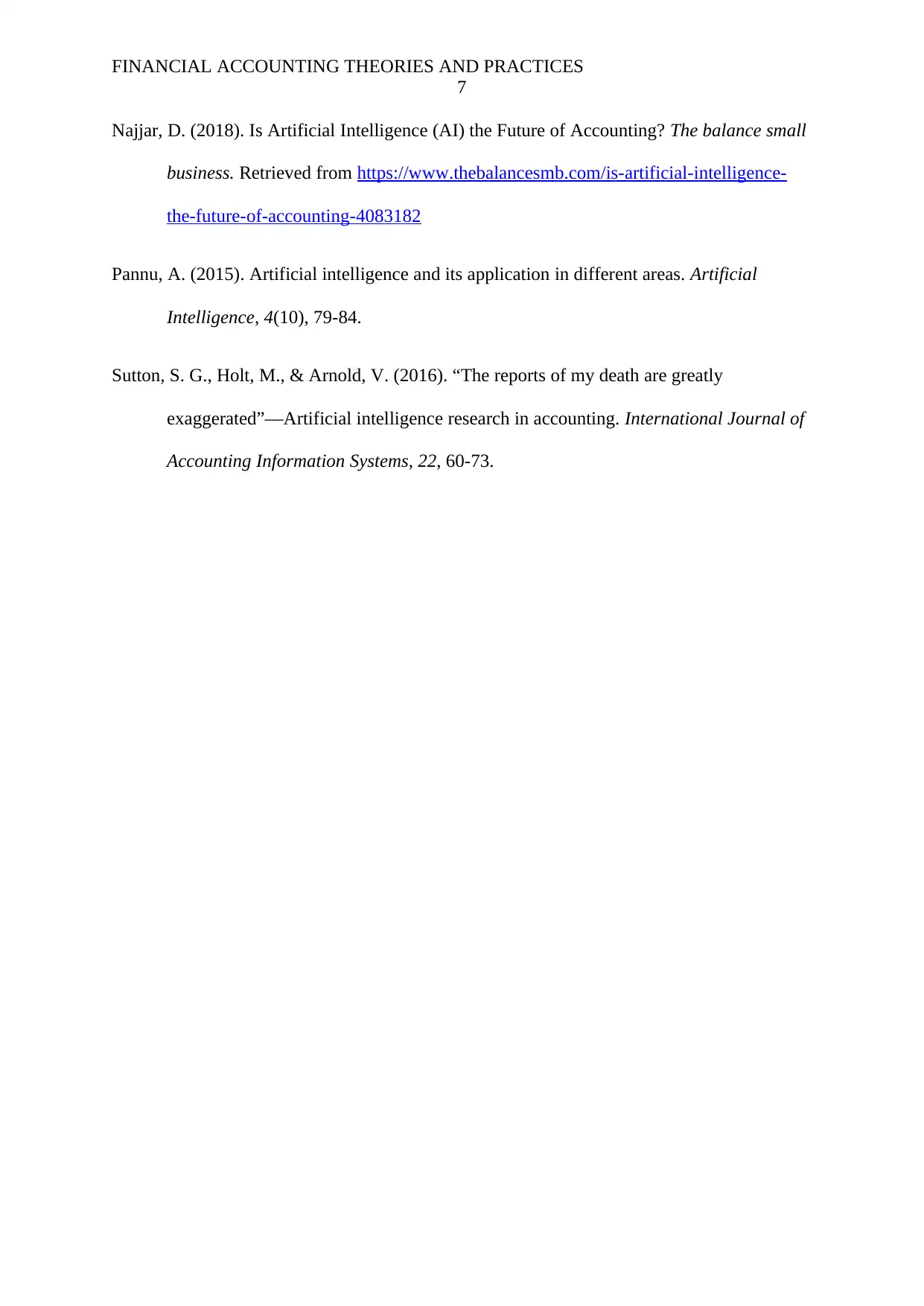
FINANCIAL ACCOUNTING THEORIES AND PRACTICES
7
Najjar, D. (2018). Is Artificial Intelligence (AI) the Future of Accounting? The balance small
business. Retrieved from https://www.thebalancesmb.com/is-artificial-intelligence-
the-future-of-accounting-4083182
Pannu, A. (2015). Artificial intelligence and its application in different areas. Artificial
Intelligence, 4(10), 79-84.
Sutton, S. G., Holt, M., & Arnold, V. (2016). “The reports of my death are greatly
exaggerated”—Artificial intelligence research in accounting. International Journal of
Accounting Information Systems, 22, 60-73.
7
Najjar, D. (2018). Is Artificial Intelligence (AI) the Future of Accounting? The balance small
business. Retrieved from https://www.thebalancesmb.com/is-artificial-intelligence-
the-future-of-accounting-4083182
Pannu, A. (2015). Artificial intelligence and its application in different areas. Artificial
Intelligence, 4(10), 79-84.
Sutton, S. G., Holt, M., & Arnold, V. (2016). “The reports of my death are greatly
exaggerated”—Artificial intelligence research in accounting. International Journal of
Accounting Information Systems, 22, 60-73.
1 out of 8
Related Documents
Your All-in-One AI-Powered Toolkit for Academic Success.
+13062052269
info@desklib.com
Available 24*7 on WhatsApp / Email
![[object Object]](/_next/static/media/star-bottom.7253800d.svg)
Unlock your academic potential
Copyright © 2020–2026 A2Z Services. All Rights Reserved. Developed and managed by ZUCOL.

